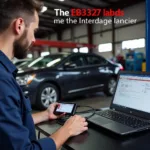If you’re a proud owner of a 2004 BMW 545i, you know the thrill of its powerful engine and luxurious ride. But like any high-performance machine, it can sometimes throw a curveball in the form of an illuminated check engine light. When this happens, understanding the cryptic codes your car’s onboard diagnostic system (OBD2) spits out is crucial. Two such codes that often leave 545i owners puzzled are 2760 and 2761. This article dives deep into these codes, exploring their causes, symptoms, and potential solutions.
Understanding OBD2 Codes 2760 & 2761
Before we jump into the specifics of each code, let’s understand their context within your 545i’s intricate system:
-
Code 2760: This code points to a problem with the “Input Shaft Speed Sensor Circuit.” This sensor plays a vital role in monitoring the rotational speed of your transmission’s input shaft, which directly influences gear shifting and overall transmission performance.
-
Code 2761: This code signals an issue with the “Input Shaft Speed Sensor Signal.” This indicates that the sensor itself might be faulty or the signal it’s sending to the transmission control module (TCM) is inaccurate or inconsistent.
Common Symptoms
Experiencing either of these codes might come with a few telltale signs:
-
Transmission Malfunctions: You might notice rough or delayed gear changes, slipping gears, or even a complete inability to shift gears.
-
Illuminated Warning Lights: The check engine light is the most obvious indicator, but you might also see other warning lights related to the transmission or drivetrain.
-
Reduced Fuel Efficiency: A malfunctioning input speed sensor can disrupt the transmission’s ability to select the optimal gear, leading to decreased fuel economy.
-
Limp Mode: In severe cases, your 545i might enter “limp mode” to prevent further damage. This limits engine power and speed to allow you to limp to a safe location.
What Causes These Codes?
Several culprits can trigger these OBD2 codes in your 2004 BMW 545i:
-
Faulty Input Speed Sensor: The sensor itself could be worn out, damaged, or experiencing electrical issues, leading to inaccurate readings.
-
Wiring Problems: Damaged, corroded, or loose wiring connections between the sensor and the TCM can disrupt signal transmission.
-
Transmission Fluid Issues: Low, dirty, or incorrect transmission fluid can affect the sensor’s operation and trigger error codes.
-
TCM Malfunction: While less common, a faulty transmission control module can misinterpret sensor data or fail to communicate properly.
Diagnosing the Problem
Accurately diagnosing the root cause requires a systematic approach:
-
Read the Codes: Use an OBD2 scanner to retrieve the specific codes stored in your car’s computer.
-
Inspect the Sensor: Visually examine the input speed sensor for any visible damage, debris, or corrosion.
-
Check the Wiring: Thoroughly inspect the wiring harness connecting the sensor to the TCM for any signs of damage or loose connections.
-
Test the Sensor: Use a multimeter to test the sensor’s resistance and voltage output to ensure it’s within specifications.
-
Inspect Transmission Fluid: Check the transmission fluid level and condition. If it’s low, dirty, or smells burnt, it needs to be addressed.
-
Consult a Professional: If you’re uncomfortable performing these diagnostic steps or the issue persists, it’s best to consult a qualified BMW mechanic.
Fixing the Issue
The solution depends on the underlying cause:
-
Sensor Replacement: A faulty sensor will likely need to be replaced. Ensure you use a high-quality replacement part compatible with your 545i.
-
Wiring Repair: Repair or replace any damaged or corroded wiring within the sensor circuit.
-
Fluid Change: If the transmission fluid is contaminated or low, a fluid change and filter replacement are necessary.
-
TCM Repair/Replacement: In rare cases, the TCM might need to be repaired or replaced, which is best handled by a professional.
Preventing Future Problems
-
Regular Maintenance: Adhere to BMW’s recommended maintenance schedule for your 545i, including regular transmission fluid and filter changes.
-
Quality Parts: Always use high-quality replacement parts, especially for sensors and electrical components.
-
Address Issues Promptly: Don’t ignore warning lights or unusual transmission behavior. Address issues early to prevent further damage and costly repairs.
Conclusion
While encountering OBD2 codes 2760 and 2761 in your 2004 BMW 545i can be concerning, understanding their implications and potential causes empowers you to address the issue effectively. By following the diagnostic and repair tips outlined above, you can get your 545i back to its smooth-shifting glory and enjoy many more miles on the road.

